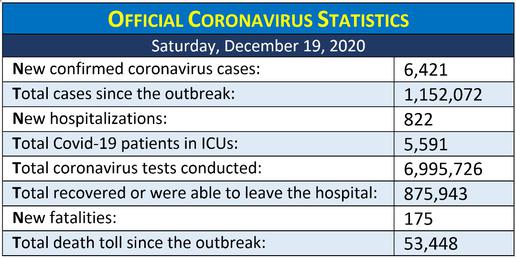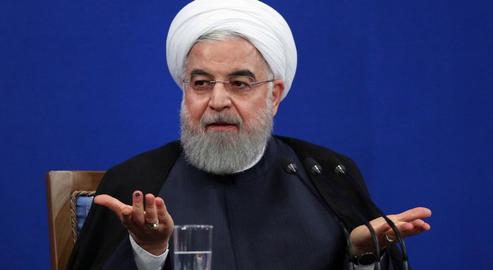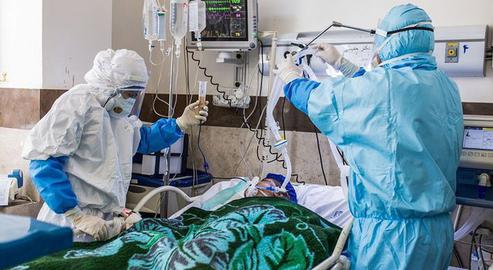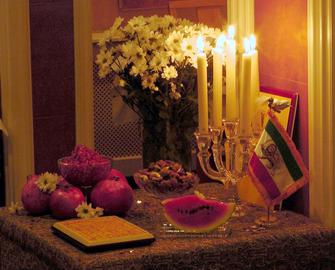According to the Iranian Ministry of Health, as of December 19, no city in Iran is in a red state of alert. The number of Covid-19 fatalities has fallen to between 150 and 200 per day and the number of hospitalizations and visits to hospitals have fallen as well. Nevertheless, two upcoming occasions have been the cause of concern among health officials.
The first is Yalda, the night of the winter solstice and the longest night in the year in the northern hemisphere, which Iranians traditionally celebrate by gathering with family members and close friends. This year Yalda falls on December 21 and health officials have been advising Iranians that this year they should be content with virtual get-togethers to prevent coronavirus from spreading.
The second is Fatimiyya, the days on the Islamic lunar calendar when Shias mourn the martyrdom of the Prophet Mohammad’s daughter Fatimah al-Zahra. This year this commemoration begins on January 17, 2021; but since there is no agreement on the exact date of the martyrdom, the mourning period lasts for days.
Shop closures and traffic restrictions in Iran started earlier on Saturday in an effort to avert a resurgence of coronavirus infections and deaths as Iranians prepare for the Yalda winter festival on Sunday night. Shops were ordered to close two hours earlier, from 6pm on Saturday and Sunday, deputy Health Minister Alireza Raisi announced on state television. A traffic curfew was brought forward an hour to 8pm until 4am.
The government, however, is discriminating between Yalda gatherings, a national tradition, and mourning ceremonies for the martyrdom of Fatimah al-Zahra. President Rouhani has asked people not to participate in Yalda gatherings but announced that ceremonies during Fatimiyya will be permitted provided the ceremonies comply with health protocols.
Considering that mourning ceremonies during the month of Muharram were followed by a surge of coronavirus in September, Rouhani’s statements about allowing religious ceremonies was not well-received on social networks.
Speaking at the meeting of the National Coronavirus Taskforce, Rouhani expressed satisfaction with the measures taken to develop a domestic vaccine, and issued instructions to expedite financing for the purchase of vaccines from abroad. He also boasted that Iran’s economic growth has been positive despite the pandemic and international sanctions.
Pfizer not the only option
Mostafa Ghanei, head of the National Coronavirus Taskforce’s Scientific Committee, announced that Iran has not ruled out the purchase of coronavirus vaccines from other countries, saying that the vaccine produced by Pfizer is not the only option for Iran because there are other vaccines that meet the country's needs.
Ghanei said that two issues matter in buying the Pfizer vaccine; one is its price and the other is the temperature of minus 70 degrees centigrade that it requires for storage and transportation. Iran is able to buy a vaccine with transport requirements that are compatible with the country's infrastructure and at a more affordable price, if produced by a reputable company, and there is no reason to buy a vaccine that where the necessary transport infrastructure is lacking, Ghanei said.
He emphasized that Iran will not replace the Pfizer vaccine with those of Russia and China, noting that Europe now also has a vaccine, and AstraZeneca has announced that it will produce as many as three biullion doses of its own vaccine and that the AstraZeneca vaccine does not have extreme transport requirements.
Provinces round-up
The number of coronavirus infections, hospitalizations and fatalities in Razavi Khorasan province has fallen by more than 50 percent during the past month, reported Javad Hosseini, vice president of Mashhad University of Medical Sciences. He said that the number of hospitalized Covid-19 patients in the provincial capital has fallen from more than 1,400 to less than 700.
In tune with other government and health officials, Hosseini advised people to celebrate Yalda by remote get-togethers, otherwise a “black winter” would be awaiting Iranians.
In the past 24 hours, 11 other Covid-19 patients died in Golestan, a high number for this province. Currently 512 coronavirus patients are hospitalized in Golestan of whom 106 are being treated in ICUs and 60 are breathing through ventilators. “Last week this province witnessed a high number of hospitalizations and deaths,” said Hadi Haghshenas, governor of Golestan. “In the past couple of weeks the number of fatalities was in single digits for three days but it was in double digits over the remaining days. If restrictions are lifted completely under these conditions, these numbers will undoubtedly rise. Restrictions on businesses will unquestionably lead to hardships and it is a difficult situation but we have no other way but to make such decisions.”
Currently 236 Covid-19 patients are hospitalized in Yazd province, 76 in intensive care units. In the past 24 hours another three coronavirus patients died in Yazd and, according to Dr. Mohammad Nouri Shadkam, vice president of Yazd University of Medical Sciences, more than 70 percent of fatalities in the province have been over the age of 70, some with underlying health conditions but some without.
Iran’s Latest Coronavirus Statistics
In her daily briefing for December 19, health ministry’s spokeswoman Dr. Sima Sadat Lari announced the official coronavirus statistics for the past 24 hours:

visit the accountability section
In this section of Iran Wire, you can contact the officials and launch your campaign for various problems



























comments